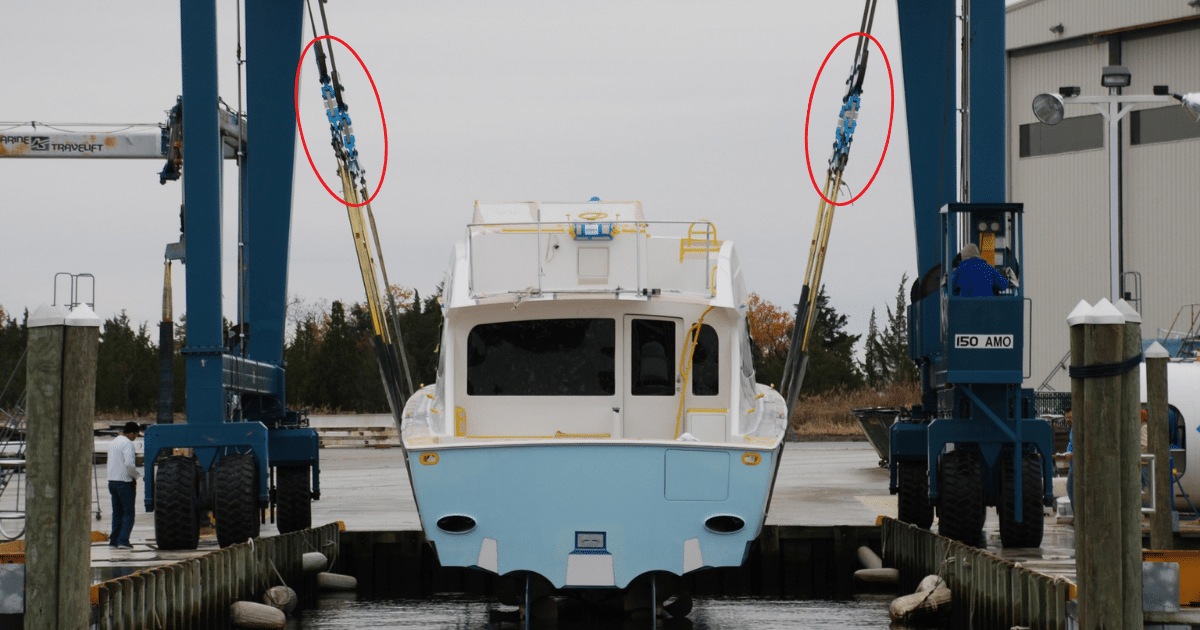
Crane scales are equipment that provides weight measurements for suspended loads across diverse sectors like OEMs, oil and gas, agriculture, mining, and many others.
These weighing devices are designed for overhead measurements, ensuring operational efficiency and risk mitigation within industrial operations.
Available in diverse configurations and functionalities, navigating through the options is essential for selecting the most appropriate crane scale for your specific industrial applications.
Industrial operations rely on these scales for their lifting endeavors, making it essential to understand all the options in order to identify the ideal match for precise weight measurement needs.
Keep reading, and we will provide the information you need to make the best decision.
What is a Crane Scale?
Unlike conventional scales, crane weight scales are specifically engineered to determine the weight of heavy loads during lifting operations.
A powerful load cell that interfaces with the lifting equipment is central to their design, providing real-time weight readings as the load is hoisted.
Because of the load cell, crane scales incorporate advanced sensor technology and robust construction, ensuring precision, durability, and safety in high-stakes lifting scenarios.
Crane scales can operate with different types of cranes, hooks, and lifting mechanisms, highlighting their versatility and making them valuable tools for companies that rely on precise weight measurements during lifting operations.
What is a Crane Weighing System?
This system describes a network of components that ensure precise weight measurement, data management, and operational safety during lifting activities.
At its core, a crane weighing system revolves around the industrial crane scale itself—a sophisticated weighing device meticulously engineered to ascertain the weight of suspended loads accurately during lifting maneuvers.
This pivotal component typically consists of a load cell affixed to the crane’s hook or suspension apparatus, serving as the frontline sensor responsible for capturing and transmitting weight data.
A comprehensive crane weighing system can also encompass a suite of auxiliary components and features that may include advanced digital displays or indicators, allowing operators to view weight readings in real-time.
Wireless connectivity options that facilitate seamless data transmission and systems that integrate with existing industrial equipment or control systems are also options.
All these integrations together make crane weighing systems offer a holistic approach to load management in general, helping optimize efficiency and maintain safety protocols.
Applications of Crane Scales
From OEMs handling heavy machinery parts to the oil and gas sector lifting large containers, crane scales ensure accurate weight measurements, enhancing operational efficiency and safety.
Some of the most common applications are:
1. Manufacturing Sector
- Heavy Machinery Production: Crane scales are instrumental in weighing and handling components and parts in the manufacturing of heavy machinery. They ensure precise weight measurements during assembly processes.
- Quality Control: In manufacturing units, industrial crane scales aid in quality control by verifying the weight of finished products and ensuring compliance with specified standards before distribution.
2. Logistics and Warehousing
- Inventory Management: Crane weight scales facilitate efficient inventory management by accurately weighing bulk materials or goods during loading and unloading procedures.
- Shipping and Freight: In logistics, crane scales play a pivotal role in determining the weight of cargo containers ensuring compliance with weight regulations for safe transportation.
3. Construction Industry
- Material Handling: Crane scales assist in measuring and lifting construction materials such as bulk materials, steel beams, concrete blocks, and prefabricated elements, ensuring precise weight distribution on-site.
- Safety Compliance: These scales contribute to adhering to safety standards by monitoring loads to prevent overloading or exceeding weight-bearing capacities on construction cranes.
4. Agriculture and Farming
- Harvesting: In agricultural settings, crane scales are used to weigh and manage bulk produce during harvesting activities, aiding in accurate yield measurements.
- Livestock Handling: Crane scales help in weighing livestock for health assessments or commercial transactions in farming operations.
5. Mining and Extraction
- Extraction Processes: Crane scales play a crucial role in mining operations, accurately measuring mined materials during extraction processes and optimizing load capacities for safe transportation and processing.
- Safety Measures: These scales ensure compliance with safety protocols by monitoring loads to prevent equipment strain or accidents in mining settings.
6. Oil and Gas Industry
- Offshore Operations: Crane scales are utilized in offshore platforms for lifting heavy equipment or containers, ensuring precise weight measurement for safe handling and transport.
- Pipeline Maintenance: During maintenance activities, crane scales aid in measuring and handling components such as pipes and valves, ensuring accurate weight assessments.
7. Renewable Energy
- Wind Turbine Installation: Crane scales assist in installing and lifting components for wind turbines, ensuring safe and efficient assembly.
- Solar Panel Installation: These scales help in lifting and positioning solar panels during installation by accurately measuring loads for optimized placement.
Establishing Your Objectives for Overhead Weighing
1. Load Monitoring
Crane scales assist in real-time load monitoring, ensuring that weight limits are not exceeded during lifting operations. This prevents equipment strain and potential accidents.
2. Process Control
Maintaining precise control over the weight of materials being handled is critical in industrial processes. Crane weight scales enable consistent monitoring and control, facilitating workflow management.
3. Data Integration
Integrating crane scale data into existing systems allows for easy record-keeping and analysis. This data integration is a big advantage in performance assessment and predictive maintenance.
Different Types of Crane Scales
Exploring the array of heavy-duty crane scale variants unveils a spectrum of advanced technologies tailored to address specific industrial demands.
Let’s explore the various types of crane scales, discovering their functionalities, applications, and benefits across numerous industrial domains.
1. Tension Load Cell Dynamometer
- Functionality: Tension load cell dynamometers are engineered to measure tensile forces accurately. These devices are ideal where precise tension measurements in cables, ropes, or lifting configurations are essential.
- Applications: Commonly used in scenarios such as material testing, construction, and offshore operations, tension load cell dynamometers provide critical data on the tensile strength of materials or structures.
2. Wireless & Wired Load Shackle
- Wireless Variant: Wireless load shackles offer the advantage of transmitting weight data without physical wires, ensuring flexibility and ease of use. They are suitable for remote or dynamic applications.
- Wired Variant: Wired load shackles come with physical connections for data transmission, ensuring reliability in situations where wireless connectivity might not be feasible or where consistent data transmission is required.
3. Custom Tension Load Cell Dynamometer
- Tailored Applications: Custom tension load cell dynamometers are specifically designed to meet unique industrial requirements. They are used in specialized lifting applications where standard crane scales are not enough, such as in mine hoisting applications.
- Customization Benefits: Customized solutions offer adaptability and accuracy, catering to specific load-bearing needs. At Massload, we have a team of experts who can work with you to build the best solution to your situation. Visit our website to understand more.
4. Custom Load Pin
- Purpose: Load pins are crafted to replace existing load-bearing pins in machinery or equipment, seamlessly integrating weight measurement capabilities without altering the original design or taking up precious headroom.
- Unique Applications: Our custom load pins can be designed to your requirements if a standard load pin doesn’t work for you. Get in touch, and we can work together to design a project that fits the needs of your industry.
5. Floating Running Line Tensiometer
- Continuous Tension Measurement: Floating running line tensiometers are employed in scenarios requiring continuous and real-time tension measurements on moving ropes or cables.
- Accurate Monitoring: These devices offer a dynamic way to measure tensions as loads vary.
6. S-Type Tension Compression Load Cell
- Versatility: S-type tension-compression load cells are versatile devices capable of measuring both tension and compression forces. They find applications where force measurement in both directions is necessary.
- Applications: These load cells offer reliability and accuracy in measuring forces in diverse load-bearing scenarios.
7. Dead-End Wireline Tension Monitor
- Specialized Function: Dead-end wireline tension monitors are designed for wireline applications, ensuring precise tension measurement at the dead end of cables or ropes.
- Industry Usage: Commonly utilized in oil and gas extraction, these monitors aid in optimizing lifting operations and maintaining safety standards in wireline applications.
8. Hanging Crane Scale
- Direct Suspension: Hanging crane scales directly suspends from the lifting hook, providing a straightforward solution for overhead weighing in various industrial settings.
- Versatile Applications: Widely used in manufacturing, warehousing, and shipping, these scales offer ease of use and reliable weight measurements for diverse loads.
9. Rope Attachments
- Varied Attachments: Rope attachments encompass a range of fixtures, hooks, or clamps designed to securely fasten heavy-duty crane scales to different types of ropes or cables.
- Customization Options: These attachments cater to specific load-bearing configurations.
Comprehending each crane scale type, their functions, and their relative benefits is imperative for industries searching for the most suitable solutions for their overhead weighing requirements.
By understanding their functionalities and real-world applications, businesses can make informed decisions that will optimize efficiency, safety, and productivity within their operations.
The truth is that crane scales serve as indispensable tools that drive operational excellence and safety across a spectrum of industrial domains.
As technology continues to evolve, the integration of advanced features and tailored solutions within crane weight scales promises it is going to be even more indispensable for modern industrial practices.
So, how about starting your industry transformation right now?
Empower Your Operations with a Crane Scale from Massload
Explore our cutting-edge crane scales carefully designed to meet your specific industry needs, or contact our experts today, and let’s talk about the solution that best suits your company.


